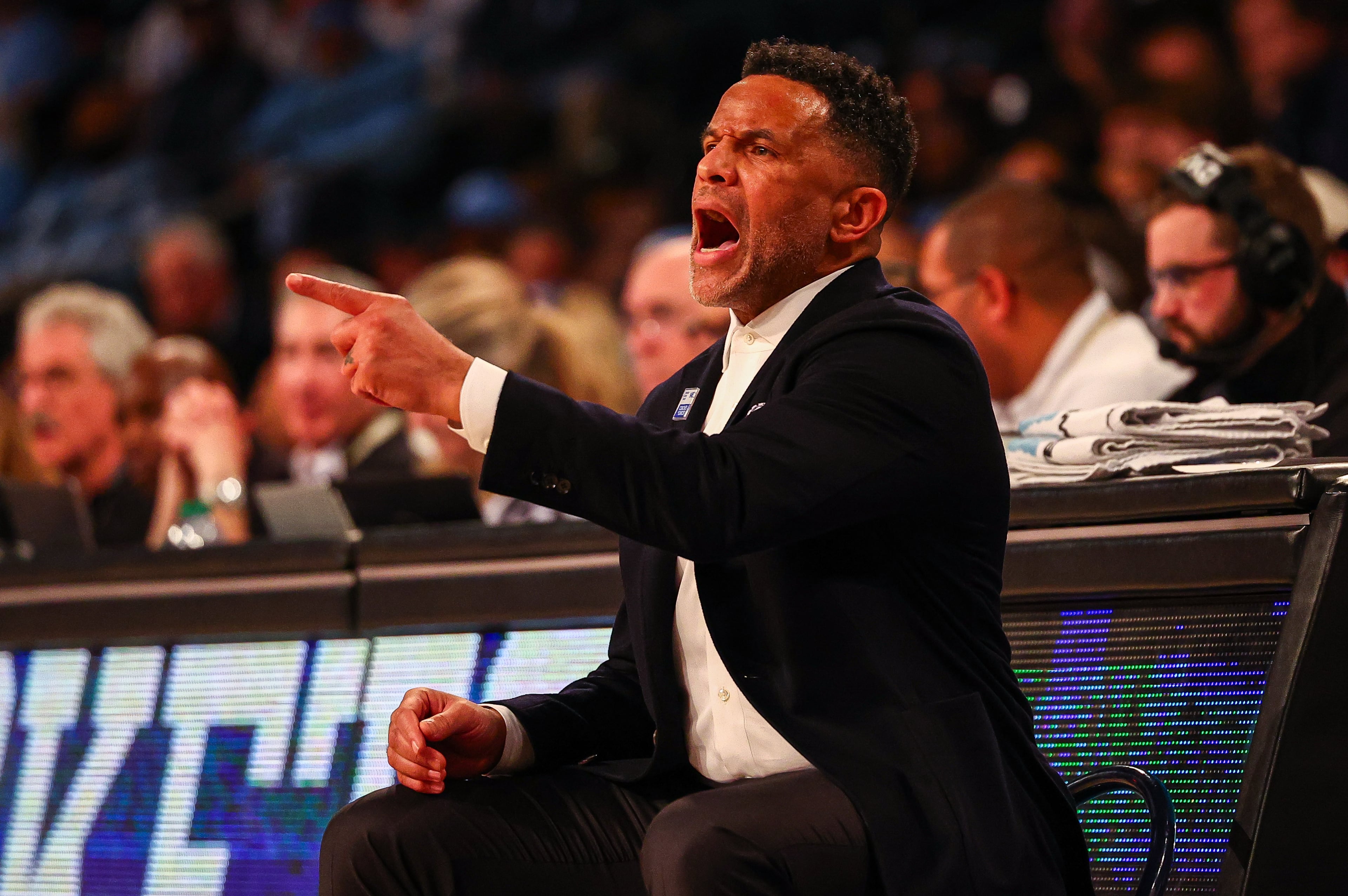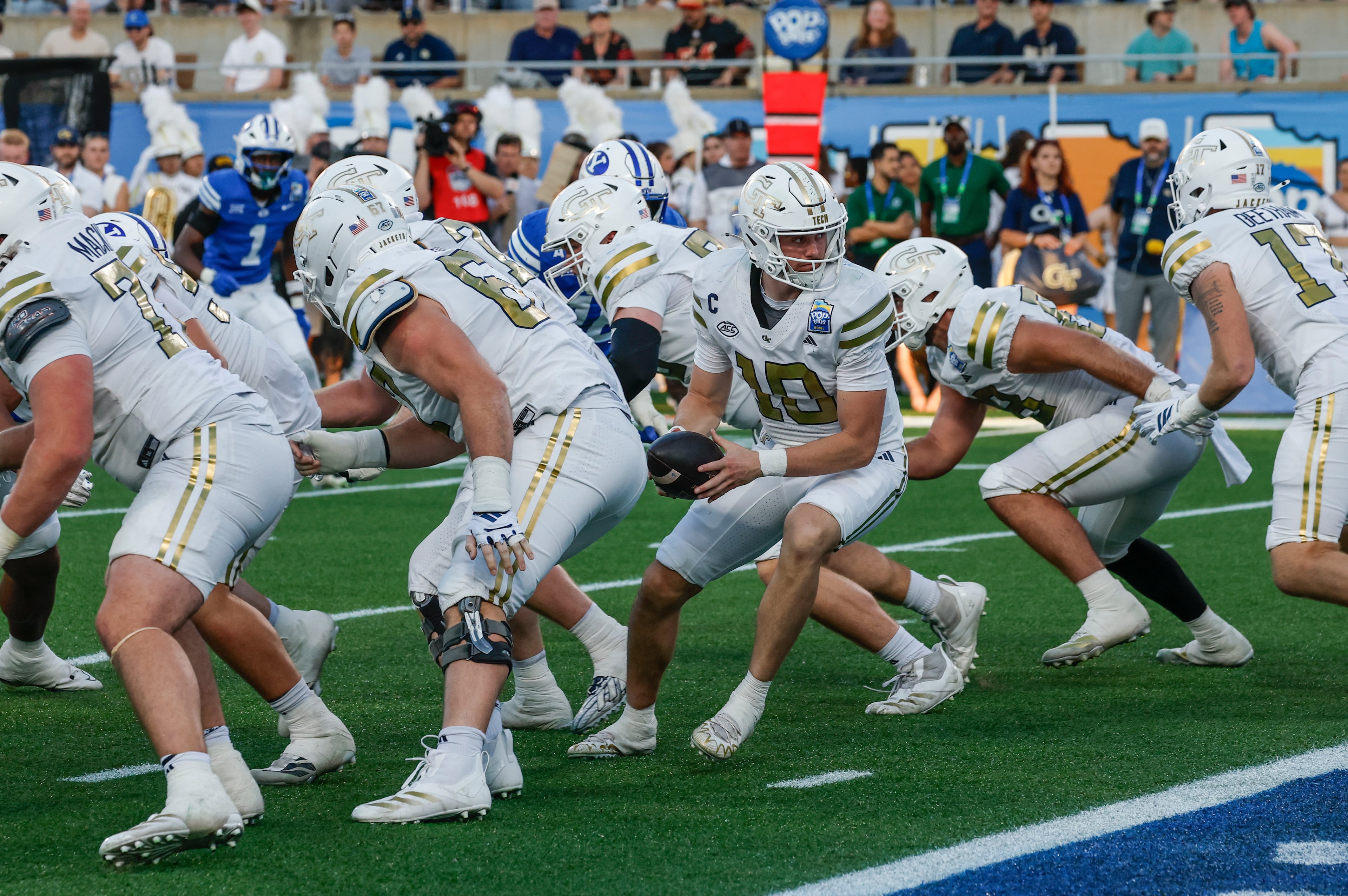Breaking down Georgia Tech’s wild first-quarter sequence

With 4:16 to play in the first quarter of Saturday’s game, Virginia led 7-3 and took possession at its 1-yard line. Quarterback Bryce Perkins was trying to lead the Cavaliers on another scoring drive after they tore through Georgia Tech on their opening possession.
But in less than a minute’s time off the game clock, the Yellow Jackets had taken a 13-7 lead with scores on a safety, a touchdown off a return of the ensuing free kick and then a two-point conversion, all on consecutive plays. It was a highly unusual combination and proved essential to the Jackets’ 30-27 overtime victory.
It would not be a surprise if, in Tech’s 126-season history, that that three-play sequence had ever played out in such a manner. In the 11-season tenure of coach Paul Johnson, the Jackets had previously never scored on a safety and two-point conversion in the same game, let alone within three plays of each other. Off the top of his head, Johnson could not recall a free kick following a safety being returned for a touchdown, and he has been coaching since 1979.
Without much prompting, diehard Tech fans can likely cite any number of bad breaks and lightning strikes that have befallen the Jackets. Earlier this season, Tech fumbled on three consecutive plays against Duke and lost all of them, spelling doom for the Jackets in their 28-14 defeat. Saturday, it was the Jackets striking their opponent with a flurry of big plays in less than a minute’s time.
The safety
After Pressley Harvin punted Virginia down to its 1-yard line, the Cavaliers faced 2nd-and-9 from their 2-yard line. Virginia quarterback Bryce Perkins ran what looked like a designed sprintout to the left. Linebacker Brant Mitchell rushed Perkins on a delayed blitz between left tackle Ryan Nelson and left guard R.J. Proctor, getting through untouched. Mitchell grabbed hold of the slippery Perkins by his right hand (the right-handed quarterback had slipped the ball to his left hand as Mitchell approached) and held on tight, eventually wrapping up his left leg. Nose tackle Brandon Adams finished the play, knocking Perkins downs and causing a leg injury that kept Perkins out of the game for a possession. Mitchell’s sack cut Virginia’s lead to 7-5 at the 3:24 mark of the first quarter.
Mitchell continued his improving play in the latter half of the season. He had a team-high eight tackles (one for loss) against Miami and nine against North Carolina (one for loss).
The sack was noteworthy as the Jackets (including Mitchell) have had difficulty bringing down quarterbacks for sacks, often letting them slip out of their grasp to allow them to scramble for yards, and Perkins is precisely the sort of quarterback who might have been expected to take advantage of that shortcoming. But not Saturday. It was Tech’s first safety since the Tulane game in 2015, and the first that Virginia had surrendered since it played Boise State in 2017.
The play was set up by the two previous plays. The first was the punt by Harvin, who first had to get up in the air to receive a high snap. Jaytlin Askew, running downfield from the gunner position, charged directly at punt returner at Tavares Kelly, who was in position to field the punt near the 10-yard line but jumped out of the way to avoid Askew, allowing the ball to hit the ground and then be downed at the 1-yard line by Jalen Johnson. It was a net of 57 yards, another magnificent punt by Harvin and cover by his team.
The return
On the ensuing play, Virginia punter Lester Coleman took the free kick from the Cavaliers’ 20-yard line. Thomas caught the ball between the numbers and the Virginia sideline at the Tech 23, a well-positioned kick to hem Thomas in. To Thomas’ left, linebacker Victor Alexander took on a block to hold up a Virginia would-be tackler and, directly ahead of him, Antwan Owens, Bruce Jordan-Swilling, Quez Jackson and Tyler Cooksey jailed three Cavaliers in blocks, giving Thomas a straight shot up the field. Thomas was past the Tech 45 before he encountered a would-be tackler, the punter Coleman. Thomas took care of Coleman with a cut to his left to the middle of the field, ran through a diving tackle attempt and was home free.
Johnson gave Thomas the kick-return job at the start of the season, seeing in him the playmaking ability to make the Jackets’ return team more potent. In the 11th game of the season, Thomas delivered.
“Juanyeh Thomas, on the return, is a really good athlete,” Johnson said. “It’s just been a matter of time. He’s going to return a bunch of them before he leaves. He’s pretty good.”
Thomas said he tells the return team on every kick that if he gets blocks, he promises to do the rest.
“As soon as it was kicked, I caught it, everybody had their blocks and it just opened up,” Thomas said. “And I was like, I got to hit it. And so I hit it and made one dude miss, and that’s it.”
Practice makes perfect? Not in this case.
“See, that’s the one thing,” Thomas said. “We didn’t practice (free-kick returns). I was like, do I treat it like a regular punt return or kick return? But we treat it like a regular kick return, and then we call the call, and then we just went with that call.”
It was a satisfying moment for the Jackets, whose special-teams shortcomings this season and in seasons past have been well-chronicled.
It had to be particularly so for a number of members on the return team. Alexander was on the kickoff cover teams against South Florida in which the Jackets gave up two returns for scores. Owens was involved in another special-teams gaffe against Pittsburgh, a failed fake-punt try. Jordan-Swilling was called for a hold on a kickoff return against Bowling Green, wiping out a touchdown by Thomas. For that matter, Thomas had his own special-teams mistake, fumbling a kickoff return against Duke inside the 10-yard line that helped secure the game for the Blue Devils.
For Tech, it was the first returned kick for a score since Lamont Simmons took back a botched onside kick try by Miami last season. Of more conventional returns, it was the first taken back for a touchdown since J.J. Green scored on a kickoff return against Pitt in 2016. (Returns of free kicks are statistically categorized as kickoff returns.)
It added to a recent string of special-teams plays for the Jackets, notably Wesley Wells’ string of successful kicks, Harvin’s field-flipping punts and two recovered fumbles on a kickoff and punt against Miami.
Upon his return to the sideline, Derrick Moore, Tech's character development coach, passed along the relay baton that has come to symbolize the Jackets' dependence upon all three phases of the game. Thomas in particular has latched onto the totem, carrying the baton out onto the field prior to kickoff.
“It’s been a long time since you could say that we won a game here on special teams,” Johnson said. “And (Saturday), special teams had a big part in it.”
The two-point conversion
The score was now Tech 11, Virginia 7. Johnson elected to go for a two-point conversion to push the lead to a more conventional six points. The Jackets lined up in their heavy formation, with left tackle Zach Quinney shifted across the line to the right shoulder of right tackle Andrew Marshall. The Jackets often run in that direction out of that formation, and Johnson called a misdirection play.
Quarterback TaQuon Marshall took the snap and sprinted out right, and wide receiver Brad Stewart, lined up ostensibly in the left tackle spot, dragged across the middle to the right, completely vacating the left side of the end zone.
A-back Clinton Lynch was assigned to slip across the field from his spot outside of Quinney’s right shoulder into that empty space on the left side, except for one problem. He ran right into linebacker Robert Snyder, killing the play.
Marshall planted his right foot and turned to his left to throw to Lynch. Not seeing him, he took off for the left corner of the end zone. Snyder recognized it and raced to cut off Marshall, except for now he had Lynch trying to impede him.
“Once he ran into him, he did a good job of blocking him to let TaQuon get in the end zone,” Johnson said.
It was Tech’s first successful two-point try of the season.
Aftermath
As game-changing as the sequence was, it didn’t provide much in the way of momentum. The Cavaliers took the lead right back, as backup quarterback Brennan Armstrong came in for Perkins and directed a six-play, 75-yard touchdown drive to go up 14-13. Regardless, in a game won in overtime, every point was crucial.
More from the game:
Game story: Georgia Tech takes down Virginia in overtime
Michael Cunningham: Offense stalls, so Georgia Tech wins with defense



